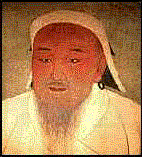'The Secret History of the Mongols' is the first literary monument
concerning the Mongols. It is believed to have been written in the year 1240 A.D.
The author of it still remains unknown. This is the only immediate source of information
about medieval mongolian life and self-consideration and also it is the invaluable
treasure for historians, linguists, ethnographs and ethnologist engaged in the field of
oriental studies.
The copy of The Secret History which has survived to our days
were transcribed with Chinese characters from some original manuscript
in one of the mongolian scripts. Some scholars believe it to be the Uighur script,
others proposed h`Pags-pa script (Quadratschrift) only
few think that it was originally recorded by Chinese characters.
This copy was written about 14th century and contained Mongolian text (in Chinese fonetic transcription )
and the Chinese translation.
The transcription of Mongolian text was performed in order to compile the textbook for Chinese students studying Mongolian.
First man from Europe who discovered this manuscript was Russian monk archimandrite Palladij. He was a member of the Russian Orthodox Mission in China.
He was an outstanding sinologist not mention his missionarial abilities.
In 1866 he translated Chinese part of The Secret History into Russian with a considerable contractions.
The name of this work in russian translation was 'Старинное монгольское сказание о Чингис-хане'
('An old mongolian tale about Genghis Khan').
After that, the full text of the 'Secret History' was published by S.A.Kozin in Leningrad (1941),
E.Haenisch in Berlin (1948), P.Pelliot in Paris (1949).
Very important works were the dictionary of the language of the Secret History of the Mongols
(Haenisch E. 1962) and the index to the manuscript compiled by Igor de Rachewiltz (1972).

Facsimile and transliterations
- Original text in Chinese characters: Manuscript Edition of 1936
- Transliterations:
Translations
Bibliography
- Cleaves, Francis Woodman (trans.). The Secret History of the Mongols; For the First Time Done into English out of the Original Tongue and Provided with an Exegetical Commentary, 1. (Trans., Harvard-Yenching Institute.) Cambridge: Harvard University Press, 1982.
- Kahn, Paul. The Secret History of the Mongols; The Origins of Chingis Khan: An Adaptation of the Yuan Ch'ao Pi Shih, Based Primarily on the English Translation by Francis Woodman Cleaves. San Francisco: North Point Press, 1984.
- Ligeti, L. Histoire Secrete des Mongols. Budapest, 1971.
- Pelliot Paul. Histoire secre`te des Mongols. Restitution du texte mongol et traduction francaise des chapitres I a VI; Paris 1949
- архимандрит Палладий (Кафаров) Старинное монгольское сказание о Чингис-хане // Труды членов Российской духовной миссии в Пекине - СПб., 1866 т.IV
- Ц. Дамдинсурэн. Mong`ol-un ni`uca tobciyan. Ula`anba`atur, 1947.
- Ц.Дамдинсурэн. Монголын нууц товчоо. Улаанбаатар, 1957.
- Палладий (Кафаров), рукопись. - Архив востоковедов Ленинрадского отделения ИВ АН СССР. Разр.1, оп. 3, ед.хр.2
- С.А. Козин Сокровенное Сказание Юань Чао Би Ши. Москва-Ленинград 1941.
- Б. Сумъяабаатар. Монголын нууц товчоо. усгийн галиг. Улаанбаатар 1990. (Текст китайскими иероглифами, китайский перевод, в латинской транслитерации и в уйгурском письме)
- Юань-чао би-ши: Секретная история монголов /Изд. текста и предисловие Б.И.Панкратова. М. 1962.
- Gumilyov L.N. The Secret and the Official History of the Mongols in the Twelfth and Thirteenth Centuries. //The Countries and Peoples of the East. Moscow, 1974
- J.Ch.Street 'The Language of The Secret History of the Mongols' 1957 New Haven
- Doerfer, Gerhard 'Zur Syntax der Geheimen Geschichte der Mongolen' 1954
- Doerfer, Gerhard 'Beitrage zur Syntax der Geheimen Geschichte der Mongolen' 1955 CAJ I, 1955
- Poppe Nicholas, Die Sprache der monogolischen Quadratschrift und das Yuan-ch`ao pi-shi, 1944 Asia Major, neue Folge
- Mostaert, A. Sur quelques passages de l`Histoire secrète des Mongols. (pdf, 8Mb) // (part 1) Harvard Journal of Asiatic Studies, Vol. 15, No. 3/4. (Dec., 1952), pp. 285-404; (part 2) Harvard Journal of Asiatic Studies, Vol. 13, No. 3/4. (Dec., 1950), pp. 285-361.; (part 3) Harvard Journal of Asiatic Studies, Vol. 14, No. 3/4. (Dec., 1951), pp. 329-403.
- Yuan ch`ao pi shih. Studies on The secret history of the Mongols, by Kuo-yi Pao. Bloomington, Indiana University [1965]
- Грабарь И.А. О дательно-местном падеже в 'Сокровенном сказании монголов' // Монгольский лингвистический сборник., М., 1985.
- Гумилев Л.Н. 'Тайная' и 'явная' истории монголов XII-XIII вв. //Татаро-монголы в Азии и Европе. М., 1977
- Зограф И.Т. 'Юань-чао би-ши' и пекинский диалект юаньской эпохи. //ПП и ПИКНВ. XII годичная сессия ЛО ИВ АН СССР (краткие сообщения).М., 1973.
- Рассадин В.И. Тюркские элементы в языке 'Сокровенного сказания монголов'
Publications of text and translations of 'The Secret History of the Mongols'
Grammar, lexicology, phonology and graphic of the monument
Philology
Gumilyev, Lev Nikolaevich. 'The Secret History of the Mongols in the Twelfth and Thirteenth Centuries: As They Themselves Wrote It.' Pages 193-208 in D.A. Olderogge (ed.), The Countries and Peoples of the East: Selected Articles. Moscow: Nauka, 1974.
Владимирцов Б.Я. Монгольская литература.//Литература Востока. Вып. 2. Пб., 1920.
Веселовский Н.И. Юань чао ми ши. //Энциклопедический словарь. Брокгауз Ф.А., Ефрон И.А. т.XL Б. СПб., 1904
Гаадамба Ш. 'Cокровенное сказание монголов' как памятник художественной литературы XIII века. - Канд.дис. М., 1961
Неклюдов С.Ю. Героический эпос монгольских народов. Москва., 1984
 English (Cleaves)
English (Cleaves)  Spanish (Bellerin)
Spanish (Bellerin) Czech (Poucha)
Czech (Poucha) French (Pelliot)
French (Pelliot) Russian (Палладий)
Russian (Палладий) Bolgarian (Fedotoff)
Bolgarian (Fedotoff)